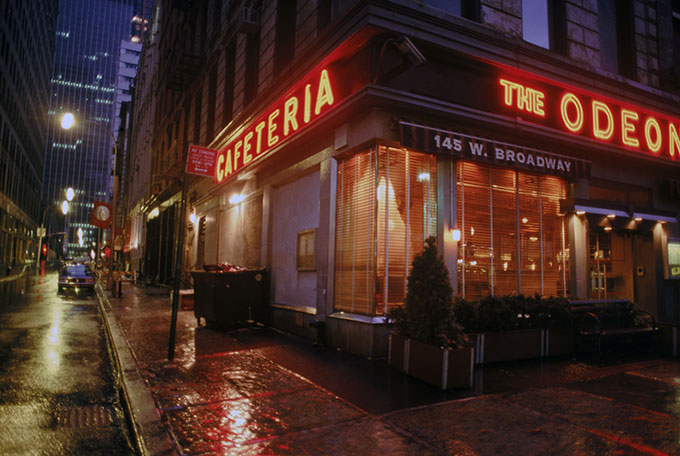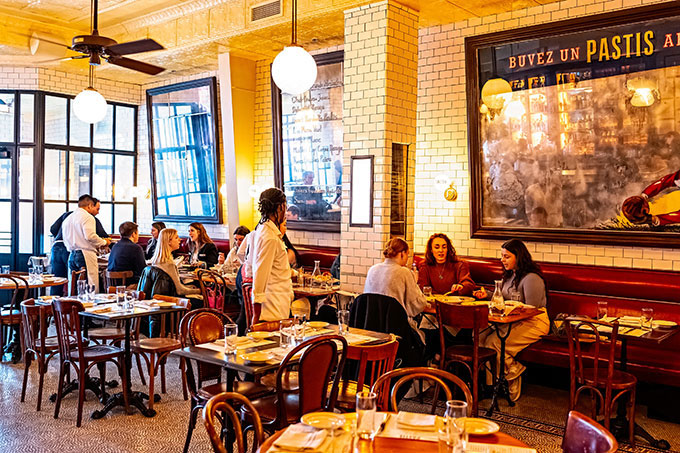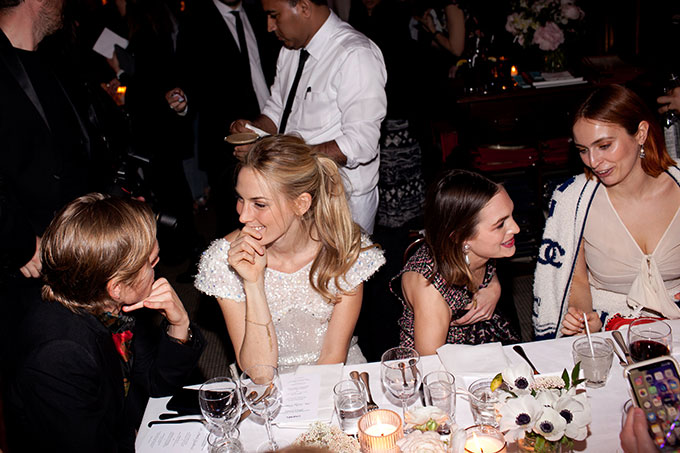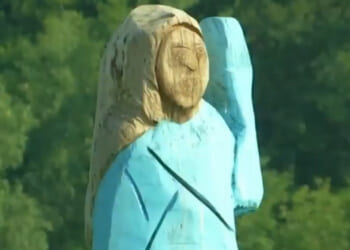I Regret Almost Everything: A Memoir, by Keith McNally (Gallery Books, 303 pp., $29.99)
On a recent Friday evening, I met a friend at the Lucy Mercer Bar, the upstairs lounge of Minetta Tavern, which opened last year in Washington, D.C.’s Union Market neighborhood. The lounge, named for Franklin Delano Roosevelt’s reported mistress, is resplendent in its décor. Its Victorian trappings, alluring paintings, and soft lighting evoke a fantasy. In the corner sat its owner, renowned restaurateur Keith McNally, who twice queued up Roxy Music’s “Avalon” from his iPad. The song matched the late-night mood. One could not help but wonder if a hooded falcon, right out of the band’s elegant 1982 music video, was perched at the bar.
As McNally writes in his new memoir, I Regret Almost Everything, nothing guarantees a successful restaurant “except that strange indefinable: the right feel,” which, he adds, “can transport a customer like nothing else. Without it, you might as well pack your bags.”
Finally, a reason to check your email.
Sign up for our free newsletter today.
McNally’s late friend Christopher Hitchens once commented that we must choose our future regrets in life. In his memoir, McNally examines past regrets, from the profound (failed marriages and paternal shortcomings) to the mundane (his disinterest in hearing the reminiscences of abstract artist Ruth Kligman, the former girlfriend of Jackson Pollock and Willem de Kooning, who lived next door to his Greenwich Village nightclub, Nell’s). It’s a soulful–and sometimes cantankerous–book of wit, candor, and depth, filled with reflections on life, New York, culture, friendship, fatherhood, and yes, restaurants, both the hits and flops.
“No one goes through life unscathed. Everybody hits the skids at one point,” writes McNally, who experienced a cataclysm in November 2016, when he suffered a stroke, which led to significant physical impairment and aphasia. “It’s hard to convey the frustration you feel when your mouth disobeys your mind’s directives,” he notes. “It’s like asking a taxi driver to take you to the White House and instead he takes you to Alcatraz.” McNally’s vivid and painful struggle—at one point he lost the will to live, which he called his failed “appointment in Samarra”—is an ongoing theme.
The British-born McNally grew up in a working-class prefab in London, a city “black and white in the fifties, closer to Victorian England than to the pizzazz of the sixties.” He left school at age 16, working as a bellhop at London’s Hilton. He harbored a love for theater and film, leading to one failed audition—for Stanley Kubrick’s A Clockwork Orange, where he “gave a choirboy’s reading for the role of a psychopathic thug. The moment I began, I saw Kubrick roll his eyes.” In time, McNally landed roles, including a part in English playwright Alan Bennett’s Forty Years On in London’s West End. “I had no idea that the twelve months I’d spend in Forty Years On would shape the rest of my life,” he writes. McNally and Bennett’s relationship eventually went beyond the platonic, and the playwright introduced the aspiring actor to an urbane world that was a far cry from his working-class roots.
It was Bennett’s friend Jonathan Miller, the theater director, who taught McNally “that only by recognizing the negligible could we understand the considerable.” One can see the fruits of this philosophy in McNally’s restaurants, which dazzle with details influenced by his past. For instance, on his mother’s side, he is descended from a long succession of French wood polishers, whose “subtle accruing of texture corresponds so closely to my approach to restaurant design that it’s not a stretch” to perceive a hereditary link. Meantime, Bennett’s house was McNally’s first encounter with an art gallery—“a few of the unadorned frames meant more to me than the artworks.” The playwright’s unique mustard walls were the “same color I’ve been trying—mostly unsuccessfully—to reproduce on my restaurants’ walls for almost fifty years.” From film scenes to Parisian trips, McNally’s observations shaped his zeal to renovate spaces into entrancing stages.
But it was the silver screen that first attracted McNally, 24 in the fall of 1975, to New York City. He took a job as an oyster shucker at a fashionable downtown restaurant called One Fifth, which opened around the time of Saturday Night Live’s debut and became the spot for the cast’s after-show parties. McNally quickly rose to manager, learning along the way how a restaurant’s “design begins and ends with lighting.” In that role, he interviewed a young midwestern woman, Lynn Wagenknecht, for a waitressing job: “After five minutes I hired her. After five years I married her.” Other than making two films in 1990 and 1992, McNally has never left the restaurant business. Together, with his brother Brian, they opened his first restaurant, The Odeon, in 1980.

“One of life’s cruelties is that we only recognize special times in hindsight,” writes McNally. This describes his late 1970s residency in SoHo, its cobbled streets pulsating “with the spirit of approaching change,” but also the opening of The Odeon, named for his childhood local cinema. Back then, as McNally describes it, Tribeca at night “was a desolate neighborhood eerily dominated by the Twin Towers.” The site, a 1930s-era cafeteria, was the only space they could afford. Renovated with details like a neon clock and pink-tinted mirrors, the restaurant was a hit—or, as he views it, “a sort of success that defies logic and defines its time.” Still owned by his ex-wife Wagenknecht, The Odeon is an Edward Hopper-esque presence with its neon lighting in Lower Manhattan’s Tribeca.
In a sense, McNally transformed Tribeca. As the New York Times reported in 1985, following The Odeon, “top-notch restaurants have been popping up like mushrooms, especially along West Broadway, Duane and Hudson Streets.” McNally’s restaurant also became part of literary memory, attracting figures like Tom Wolfe, who viewed it as the “only . . . place the outlander like myself could go,” and adorning the cover of Jay McInerney’s debut novel, Bright Lights, Big City. “My instinct told me the book was going to be a turkey,” remembers McNally. “Feeling sorry for the unknown McInerney, I let him use the image for free. Seven months later the book came out to worldwide success. So much for my instinct.”

McNally’s instinct for successful restaurants has persisted—witness Pastis and Morandi, among others. There were exceptions, too: he lists Pulino’s in the West Village among his misfires. But he has always had a strong eye for potential, such as on a hot June morning in 1995 at the corner of Spring and Crosby, when an old leather warehouse caught his attention. “I do everything by correction, especially restaurant design,” he writes. “That’s why I always go over budget.” In 1997, the warehouse was transformed into Balthazar, now considered McNally’s most successful restaurant.
Through the accumulated physical, emotional, and situational trials of his life, McNally shows the necessity of hard work to keep going. “I found the grungiest-looking alleyway in Washington, D.C., three years ago and began building Minetta Tavern on the ground floor, and a beautiful semi-private lounge I’m calling the Lucy Mercer Bar on the floor above,” he posted last June on Instagram, which has become his platform since the stroke. Today, it’s the best culinary act in Washington.

“The culture of drink endures because it offers so many rewards: confidence for the shy, clarity for the uncertain, solace to the wounded and lonely, and above all, the elusive promises of friendship and love,” wrote the late Pete Hamill, a regular at The Odeon, in his 1994 memoir. With or without the booze, that same culture can be found in McNally’s establishments. It’s all done by careful, artful design—an acute understanding of how a space, with the right feel, can suspend time and offer a sense of shelter for those who need it. After all, nobody goes through life without regrets.
Top Photo: The Lucy Mercer Bar, upstairs at Minetta Tavern, Washington, D.C. (Scott Suchman for The Washington Post via Getty Images)
Source link













